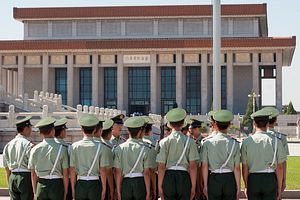In 2014, Chinese President Xi Jinping, also the chairman of the Communist Party of China (CPC) National Security Committee, put forth the “overall national security outlook,” which covers 11 fields including politics, cyberspace, culture, information, etc. Under the outlook, China issued the Counter-Espionage Law in November 2014, the National Security Law in July 2015, and the Counterterrorism Law in December 2015, and designated April 15 as “National Security Education Day.”
For this year’s National Security Education Day, anti-espionage was the top priority. However, education alone seems not enough; a new mass line campaign on anti-espionage appears to be the ultimate goal. The anti-espionage campaign so far could be divided into three main tactics — mass propaganda, comprehensive education, and, the most powerful one, mass mobilization.
Mass Propaganda With New Media Tools
Propaganda has always been one of the CPC’s most traditional and skillful tactics in launching any campaign.
As the National Security Education Day approached, a large amount of reports related to anti-espionage were published: Various regions, such as Wuhan, Hainan, and Hunan, exposed cases of anti-espionage with details; numerous articles alarmed people about “spies nearby” and “moles hidden in the darkness.”
Yet, what’s worth noting here is that the propaganda tactic has successfully kept pace with the times: new media tools are widely adopted in the campaign. Using cute cartoon images, multiple cartoon videos about national security and anti-spy propaganda have been produced, posted, and promoted on Weibo, China’s equivalent of Twitter, by China Central Television(CCTV), the China Communist Youth League, and various local public security departments. Apparently, the target audience of these cartoon videos is Chinese young netizens.
Comprehensive Education: From Elementary School to College
It is no surprise that education activities would be a part of the National Security Education Day. However, what is surprising here is the comprehensive scope of this campaign: from elementary school to college, from students to professors, everyone is the object of education.
On April 13, Jiangsu province held a grand ceremony on launching a textbook of “National Security Education for Primary and Secondary Schools,” with multiple high-level provincial officials in attendance. The textbook was reportedly the first of the kind in China.
In Guangdong Province, the Provincial Department of Education announced that all levels of schools should conduct activities on “National Security Education Day” and both college students and professors should be organized to see the exhibitions on national security.
In fact, college students, professors, and young netizens are the main objects of anti-espionage education.
According to one CCTV news report, six types of people are “most likely to be the prey of espionage agents” — veterans, students studying abroad, college students and professors, amateurs military enthusiasts, employees of the military and defense industry, and young netizens.
Mass Mobilization With Cash Rewards
Just like propaganda, mass mobilization is another old trick of the CPC, but the trick has not been frequently used since the end of Mao’s era, as the power of the masses can be unmanageable. Surprisingly, the technique of mass mobilization has been officially re-adopted in 2017, 40 years after Chairman Mao’s death, in the anti-espionage campaign.
In 2016, China set up a national anti-espionage hotline; anyone could dial 12339 to report suspected spies. This year, China provided new incentives.
On April 10, the Beijing Municipal National Security Administration announced it would offer cash rewards of up to 500,000 yuan (more than $72,000) for anyone who helps to catch a spy. Citizens could call the national hotline 12339, write letters to the National Security Administration, or report directly to the National Security Administration, where special receptionists would handle their cases.
The Beijing newspaper that reported the announcement said very straightforwardly: “Anti-spy work is in urgent need of mobilizing the masses.”
In fact, China has never denied its goal of making anti-espionage a mass line campaign. On the contrary, the Counter Espionage Law says it very clearly in Article 2:
Anti-espionage efforts follow the leadership of the party, and adhere to the principles of combining open and secret works, combining specialized efforts and the mass line, active defense, and punishment in accordance with law. [emphasis added]
Thus, all the tactics adopted by the CPC so far are in line with Chinese laws.

































